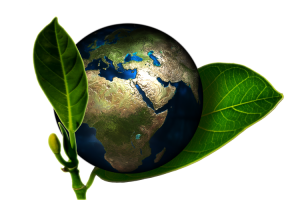By Sarah-Claire Jordan
 As the years pass, humans continue to alter the earth to the point of eliminating entire species and making air and water barely fit for anyone’s consumption. The impact we have on the environment we live in may seem like something that won’t affect us in our lifetime, but if we keep going at this rate, we will see more results than we would like. Even if that isn’t the case, we need to think about the kind of world we will leave for future generations.
As the years pass, humans continue to alter the earth to the point of eliminating entire species and making air and water barely fit for anyone’s consumption. The impact we have on the environment we live in may seem like something that won’t affect us in our lifetime, but if we keep going at this rate, we will see more results than we would like. Even if that isn’t the case, we need to think about the kind of world we will leave for future generations.
Because of these huge problems that threaten the health of our entire planet, environmental science has come to the forefront as one of the most important scientific disciplines of this era. However, with different scientists working in different countries, it can be difficult to collaborate and compile research in order to get a better perspective on a problem and its possible solutions. This is where translators with scientific backgrounds come in, to solve the following problems:
Getting Research Published in English
There are so many scientists in the world who are working hard to solve the environmental problems we are facing as a planet. A great number of them, however, are not native English speakers. English is the language of science these days, so if you can’t get your research published in English, most likely your research will not get into the right hands. Some scientists have enough knowledge of the language to write in it, but even the smallest error can jeopardize the possibility of a research paper getting published.
Translating English Research into Main Languages
The same issue comes up when major environmental research gets published in English but not in one of the main languages of the world, which include Mandarin, French, Portuguese, and Spanish. About 20% of scientific research is published in these languages, so it makes perfect sense to translate some of the more important research and reach an even wider audience. This would also just increase the general knowledge all environmental scientists would have access to and lead to more discussion of the translated research.
So, what is the solution?
Some scientists have opted to use their bilingual colleagues as editors or even writers, but they usually have their own research to attend to and won’t benefit from the arrangement. Another way around it could be to just hire scientists that have a background different languages, but again, they wouldn’t be able to dedicate all of their time to translation or writing and editing.
The best results have come from hiring translators with a science background, who are knowledgeable of the environmental issues we are dealing with and trying to remedy. Just any translator wouldn’t be able to do this, so it is essential that the one chosen to work on the project knows all of the scientific terms in both languages and can accurately translate the ideas conveyed in the source text.
Alpha Omega Translations is a translation, interpretation, and desktop publishing company that has a team of translators with various specialties. Any project can be easily handled and will be assigned to the translator with the appropriate knowledge to get the job done in a timely and accurate fashion.



